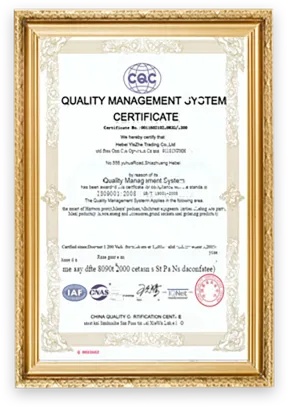Nov . 10, 2024 14:50 Back to list
Welded Wire Mesh Cost Insights and Market Trends for 2023
Understanding Welded Wire Mesh Pricing Factors and Insights
Welded wire mesh is a versatile material used in numerous construction, agricultural, and industrial applications. Its popularity stems from its strength, durability, and cost-effectiveness. However, when considering a purchase, understanding the pricing of welded wire mesh is essential for budget management and project planning.
Factors Influencing Welded Wire Mesh Prices
1. Material Composition The type of metal used in the production of welded wire mesh significantly impacts its price. Common materials include galvanized steel, stainless steel, and plain carbon steel. Galvanized wire, which is coated to prevent corrosion, may cost more than plain steel but offers better durability, particularly in outdoor applications.
2. Wire Gauge and Size The thickness of the wire (gauge) and the dimensions of the mesh (width and length) determine the overall strength and application suitability. Thicker wires and larger sizes generally yield higher prices due to increased material costs and production complexity. It’s vital to select the appropriate wire gauge for the intended purpose, balancing performance and cost.
3. Mesh Opening Size The size of the openings in the mesh affects its pricing as well. Smaller openings may require more material and a more elaborate manufacturing process, thus increasing the cost. Conversely, larger openings may lower the price but could compromise strength in certain applications.
4. Production Process The methodology used to produce welded wire mesh influences its price. Automated production lines can reduce labor costs, whereas hand-welded products may command a premium due to the craftsmanship involved. Additionally, mass-produced items typically offer better pricing due to economies of scale compared to custom-made solutions.
welded wire mesh price

5. Quantity Ordered Bulk purchases of welded wire mesh can significantly reduce the price per unit. Many manufacturers and suppliers offer discounts for larger orders, encouraging businesses and contractors to buy in bulk for cost savings.
6. Market Demand and Economic Conditions Like most commodities, the price of welded wire mesh can fluctuate based on market demand and overall economic conditions. Factors such as raw material shortages, transportation costs, and global steel prices can all contribute to variations in welded wire mesh pricing.
Where to Purchase Welded Wire Mesh
Purchasing welded wire mesh can be done through several channels, including local hardware stores, specialized building supply companies, and online retailers. Each option might offer different pricing structures, so it's worthwhile to compare costs and quality.
Conclusion
In summary, the price of welded wire mesh is influenced by various factors including material type, wire gauge, mesh size, production methods, order quantity, and market dynamics. Buyers should carefully assess their specific needs and budget constraints to make informed purchasing decisions. Understanding these elements can lead to more effective project planning and cost management, ensuring that you acquire the right welded wire mesh at a price that fits your financial framework. Whether for fencing, reinforcement, or agricultural applications, knowing the ins and outs of pricing will empower you to make the best choices for your projects.
-
The Role of Field Wire Fence in Grassland Conservation
NewsJul.15,2025
-
Stainless Steel Razor Wire Durability in Coastal Environments
NewsJul.15,2025
-
Enhancing Home Security with Mesh Fences
NewsJul.15,2025
-
Diamond Mesh Wire for Small Animal Enclosures
NewsJul.15,2025
-
Common Wire Nail Tensile Strength Testing for Woodworking
NewsJul.15,2025
-
Barbed Wire Corrosion Resistance Galvanization Techniques
NewsJul.15,2025









